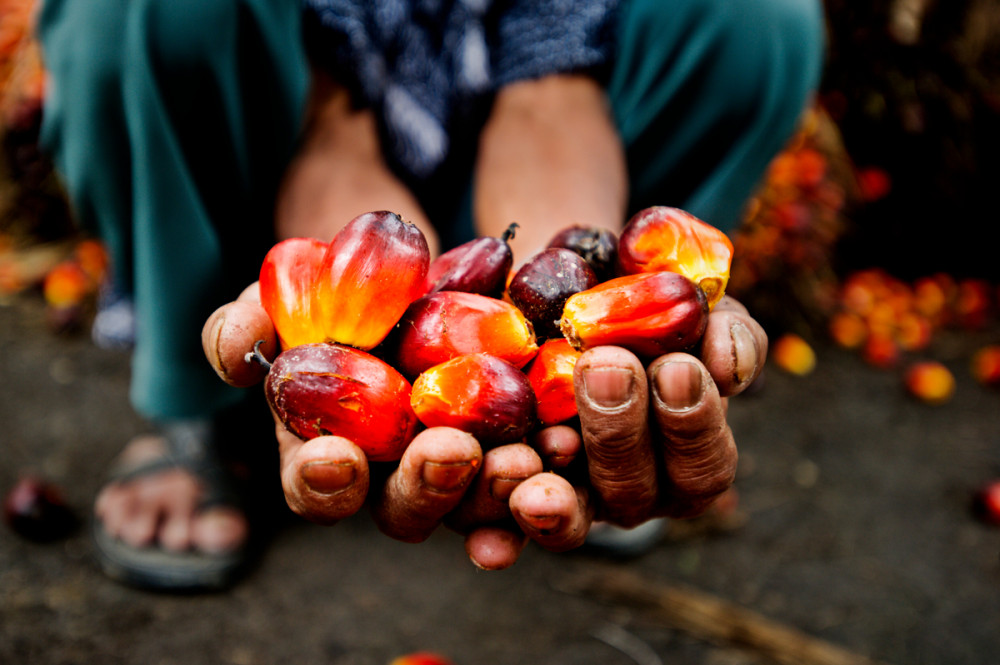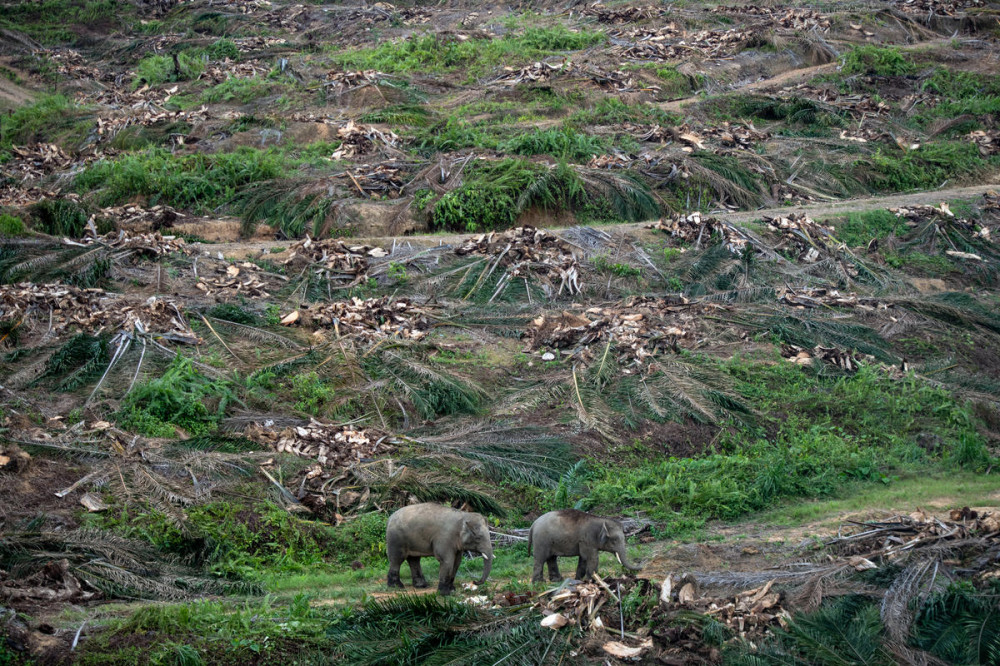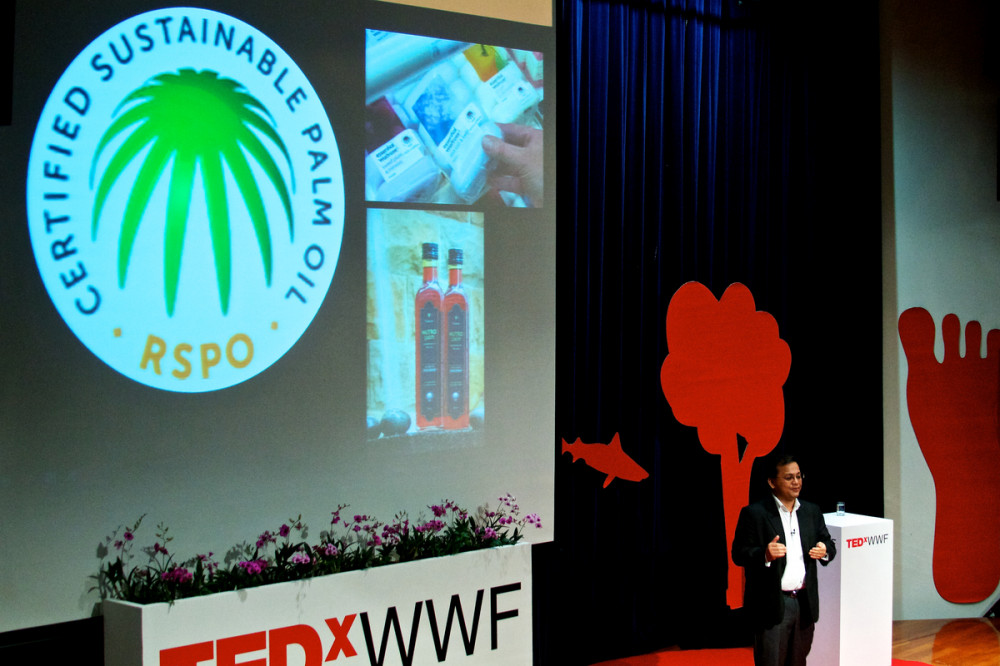1. WHAT IS PALM OIL?
It’s an edible vegetable oil that comes from the fruit of oil palm trees, the scientific name is Elaeis guineensis. Two types of oil can be produced; crude palm oil comes from squeezing the fleshy fruit, and palm kernel oil which comes from crushing the kernel, or the stone in the middle of the fruit. Oil palm trees are native to Africa but were brought to South-East Asia just over 100 years ago as an ornamental tree crop. Now, Indonesia and Malaysia make up over 85% of global supply but there are 42 other countries that also produce palm oil.

Smallholder shows the harvested palm fruit, Musim Mas palm oil plantation, Sumatra, Indonesia © James Morgan / WWF-International
2. WHAT PRODUCTS IS IT IN?
Palm oil is in nearly everything – it’s in close to 50% of the packaged products we find in supermarkets, everything from pizza, doughnuts and chocolate, to deodorant, shampoo, toothpaste and lipstick. It’s also used in animal feed and as a biofuel in many parts of the world.
3. WHY IS PALM OIL EVERYWHERE?
Palm oil is an extremely versatile oil that has many different properties and functions which makes it so useful and so widely used. It is semi-solid at room temperature so can keep spreads spreadable; it is resistant to oxidation and so can give products a longer shelf-life; it’s stable at high temperatures and so helps to give fried products a crispy and crunchy texture; it’s also odourless and colourless so doesn’t alter the look or smell of food products. In Asian and African countries, palm oil is used widely as a cooking oil, just like we might use sunflower or olive oil here.
4. WHAT IS THE PROBLEM WITH PALM OIL?
Palm oil has been and continues to be a major driver of deforestation of some of the world’s most biodiverse forests, destroying the habitat of already endangered species like the Orangutan, pygmy elephant and Sumatran rhino. This forest loss coupled with conversion of carbon rich peat soils are throwing out millions of tonnes of greenhouse gases into the atmosphere and contributing to climate change. There also remains some exploitation of workers and child labour. These are serious issues that the whole palm oil sector needs to step up to address because it doesn’t have to be this way.

Bornean elephants walk through an oil palm plantation and eat the trunks of felled old oil palm trees at Sabah Softwoods in Sabah, Borneo © Chris J Ratcliffe / WWF-UK
5. WHAT SOLUTIONS ARE THERE?
Palm oil can be produced more sustainably and things can change. The Roundtable of Sustainable Palm Oil ( RSPO) was formed in 2004 in response to increasing concerns about the impacts palm oil was having on the environment and on society. The RSPO has a production standard that sets best practices producing and sourcing palm oil, and it has the buy-in of most of the global industry. As well as committing to buy and use RSPO certified palm oil across their operations globally, WWF encourages companies to be transparent in their use and sourcing of palm oil ensuring they know who they are buying from and where it’s been produced, and to invest in and support smallholder programmes and sustainable landscape initiatives. Only with all of these ingredients can we start to accelerate the shift to a mainstream sustainable palm oil industry.

Darrel Webber, Secretary General of Roundtable on Sustainable Palm Oil (RSPO), talks about producing sustainable palm oil. TEDxWWF, Singapore. © WWF / Carolyn Lim
6. WHY DON’T WE JUST SWITCH TO AN ALTERNATIVE VEGETABLE OIL?
Palm oil is an incredibly efficient crop, producing more oil per land area than any other equivalent vegetable oil crop. Globally, palm oil supplies 35% of the world’s vegetable oil demand on just 10% of the land. To get the same amount of alternative oils like soybean or coconut oil you would need anything between 4 and 10 times more land, which would just shift the problem to other parts of the world and threaten other habitats and species. Furthermore, palm oil is an important crop for the GDP of emerging economies and there are millions of smallholder farmers who depend on producing palm oil for their livelihood. Boycotting palm oil is not always the answer, but demanding more action to tackle the issues and go further and faster, is.
7. CAN I TRUST RSPO CERTIFIED PRODUCTS?
RSPO represents the largest, independent, third-party standard for the more sustainable production of palm oil. Certified palm oil protects the environment and the local communities who depend on it for their livelihoods, so that palm oil can continue to play a key role in food security. Along with other organisations, we play an active role in influencing and shaping the RSPO standard to make sure it puts in place more safeguards for people and the planet. In November 2018 the RSPO standard was strengthened and it now represents an essential tool that can help companies achieve their commitments to palm oil that is free of deforestation, expansion on peat, exploitation and the use of fire.
WHAT CAN I DO?
You can either check the ingredients on the products we buy, and refuse the ones that contain palm oil, or specifically search for the sustainable options marked by RSPO.
Check out our new WWF Palm oil Scorecard to see which of your favourite brands and retailers are committed to sustainable palm oil free of deforestation and destruction of nature.


